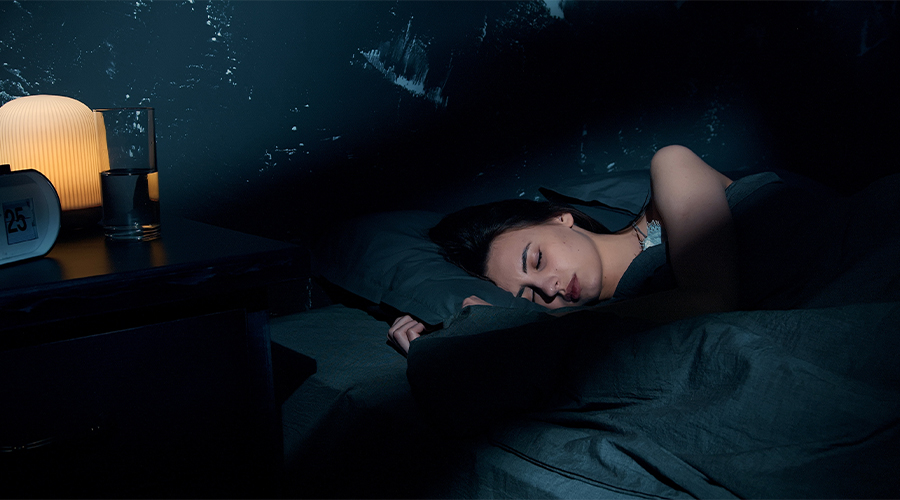

After a long, exhausting day, what’s the first thing that comes to your mind? Unwind and drift off in your bed, isn’t it? But most people spend their time scrolling through their phones for endless hours. This disrupts your sleep cycle under the radar, causing many health problems like fatigue and stress, impacting brain health, and declining skin and hair health.
You would be surprised to know that when you doze off for a sound sleep, your brain clears through neural changes within and resets itself. This blog unfolds these facts about your brain and how it clears during a sound sleep.
What Is Sound Sleep?
Since you sleep every day, you must be thinking about sound sleep. It is a state of deep sleep in which you don’t get interrupted, and your brain rests the whole time while going through different stages.
During sound sleep, your brain activates the glymphatic system (waste management system). This system is involved in removing toxins, including beta-amyloid, a type of protein associated with Alzheimer’s disease.
So, while you dream about weird things that seem to be unnatural in real life, your brain is busy detoxing itself. If you disrupt your sleep cycle, this vital process is skipped, causing poor memory, brain fog, and a risk of neurodegenerative diseases.
Assistance for Sound Sleep
If you toss and turn every night, you might need sound assistance through white noise. White noise is a consistent sound that covers up distracting noises around you, like dog barks or car honks. It creates a soothing environment that allows you to sleep faster and better. It is a sleep-friendly technique for those who struggle to sleep peacefully every night.
Benefits of White Noise
White noise is known to have positive effects on your sleep. Let us acquaint you with its benefits here:
- Better sleep quality
- You don’t struggle to sleep
- Blocks sudden noises around
- Creates a soothing environment for bedtime
You can try smartphone apps to create white noise or set your surroundings’ noise to create a sleep-induced ambience.
How to Get Sound Sleep at Night?
Even when we feel sleepy, most of us might binge-watch our favourite shows till 1 or 2 AM. Since you know a sound sleep promotes brain detoxification, here are some practical tips to slip into a deep sleep:
Stick to Your Routine
Your brain and body love consistency. It shows fruitful results when you follow a routine to sleep and wake up at the same time. This routine sets your body clock, making it easier to have a deep sleep naturally.
Cut Down on Time for Using Screens
These days, most of us spend more time in front of screens—be it phones, laptops, or computers. These screens radiate blue light, which messes with our melatonin levels and further confuses our brains to stay awake. Keep your eyes off the screen at least an hour before you sleep.
Create a Relaxing Ambiance
Before you hit the bed, meditation, a warm shower, or light stretching can signal your brain to unwind and relax. You can combine these activities with white noise or relaxing music.
Keep Your Room Cool, Clean, and Dark
Your body temperature naturally dips during sleep, so you should maintain a cool and ideal room temperature. You can also use black curtains and eye masks and turn the lights off to create a perfect sleep environment.
Watch Your Plate for Mindful Eating
Maintaining your sleep cycle is not solely the responsibility of your brain; you also need to focus on what you eat and drink. Alcohol and caffeine just before bedtime can affect your sleep. Instead, consume sleep-friendly snacks like bananas or chamomile tea.
Workout Everyday
Exercise every day to keep your body moving and regulate sleep patterns. If you workout at night, try to wrap it up at least one hour before bed. Otherwise, you might feel energised during your bedtime and struggle to sleep.
Reduce Stress Levels
Rethinking the same thoughts over and over can lead to stress, and this doesn’t let you sleep anyway. To combat stress, you can try journaling, deep breathing, or listening to soothing music to calm your mind and sleep better.
Read More: Sleep Tracker: Does It Help?
Summing Up
Even if you wake up feeling refreshed, there are still chances that you might not be able to have a restful sleep. Your brain needs to clean out toxic waste to keep it healthy and sharp for proper functioning.
If you have been dodging your sleep schedule for a long time, it’s high time that you focus on your sleep cycle better. Eating right, meditating, doing yoga, strength training, and creating a soothing sleep environment with white noise can help you sleep better.




